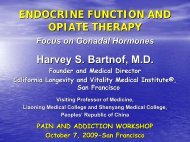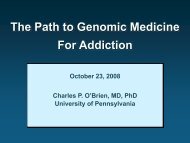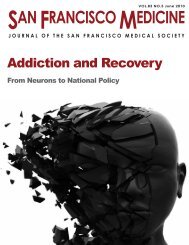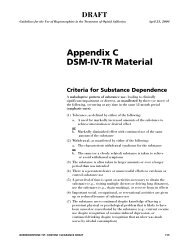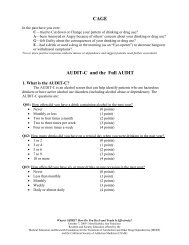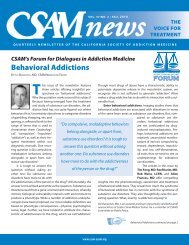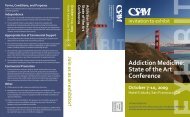Alcoholics Anonymous: cult or cure?
Alcoholics Anonymous: cult or cure?
Alcoholics Anonymous: cult or cure?
You also want an ePaper? Increase the reach of your titles
YUMPU automatically turns print PDFs into web optimized ePapers that Google loves.
434 ALCOHOLICS ANONYMOUS<br />
Table 1.<br />
Characteristics of alcoholics at age 70 who either met criteria f<strong>or</strong> stable abstinence <strong>or</strong> lifelong chronicity<br />
College coh<strong>or</strong>t<br />
C<strong>or</strong>e city coh<strong>or</strong>t<br />
Abstinent (n = 9) Chronicity (n = 32) Abstinent (n = 57) Chronicity (n = 44)<br />
Age first alcoholic 34 ± 9 42± 10 28 ± 9 31± 11<br />
Years of abstinence 15 ± 11 1 ± 2 ∗∗∗ 16 ± 11 1 ± 2 ∗∗∗<br />
Years of active alcoholism 20 ± 11 23 ± 10 18 ± 9 22± 10 ∗∗∗<br />
Problem drinking sc<strong>or</strong>e 9 ± 3.0 6 ± 2 ∗∗∗ 9.7 ± 3.8 8.3 ± 3.3 ∗<br />
No. of alcoholic relatives 2.3 ± 1.2 2.3 ± 1.1 2.8 ± 1.0 2.7 ± 1.1<br />
AA meetings 137 ± 155 2 ± 9 ∗∗∗ 143 ± 327 8 ± 30 ∗∗∗<br />
Q5<br />
∗ p < 0.05; ∗∗ p < 0.01; ∗∗∗ p < 0.001; Student’s t-test. Adapted from [26].<br />
Perhaps the most convincing controlled study of the<br />
efficacy of AA came from an 8-year follow up by a behavioural<br />
psychologist, William Miller [29]. The purpose<br />
of Miller’s therapy programme had been to return alcoholics<br />
to safe drinking practices, not to produce abstinence<br />
and certainly not to involve them with AA. In addition,<br />
the patients in his study had been self-selected f<strong>or</strong><br />
motivation to return to controlled drinking, not to achieve<br />
abstinence. Nevertheless, after 8 years most Miller’s good<br />
long-term outcomes were abstinent and not controlled<br />
drinkers. In contrast to a long-term abstinence rate of<br />
20% among the 81 clients who went to less than 100<br />
meetings, 53% of the 13 clients who had subsequently<br />
made m<strong>or</strong>e than 100 visits to AA were eventually stably<br />
abstinent – a statistically significant difference.<br />
Finally, at Stanf<strong>or</strong>d, a collab<strong>or</strong>ative 8-year prospective<br />
study [30,31] undersc<strong>or</strong>ed the value of AA in contrast to<br />
professional treatment. In 8 years, the two outcome goals<br />
of less drinking and m<strong>or</strong>e abstinence were only weakly<br />
related to days of professional inpatient treatment, but<br />
robustly related to AA attendance. In sh<strong>or</strong>t, the effect of<br />
AA did not just rest on compliance with treatment.<br />
Certainly, AA is not a magic bullet f<strong>or</strong> every alcoholic.<br />
In my own follow-up studies, there were a few men who<br />
attended AA f<strong>or</strong> sc<strong>or</strong>es of meetings without improvement.<br />
N<strong>or</strong> is it that professional treatment is ineffective.<br />
Session f<strong>or</strong> session I suspect that alcohol professionals<br />
and AA meetings are equally effective. Rather, the efficacy<br />
of AA is like the use of insulin and digitalis; AA<br />
does not stop once the patient leaves the clinic.<br />
Side-effects<br />
The third ‘scientific’ question I must address is: Even<br />
if AA does <strong>cure</strong> alcoholism, is it safe What are the sideeffects<br />
of AA Certainly, AA has its detract<strong>or</strong>s. Designed<br />
to affect the reptile brain the rhet<strong>or</strong>ic and the emotional<br />
language of the spirituality of AA leads journalists and<br />
social scientists to understandably fear that AA is a religion<br />
<strong>or</strong> <strong>cult</strong> [4,32]. Cults can lead to demagoguery and<br />
exploitation. Religion can lead to exclusion, bigotry and<br />
even war. Individual alcoholics attending incompatible<br />
AA groups <strong>or</strong> allying themselves with unf<strong>or</strong>tunate spons<strong>or</strong>s<br />
sometimes tell h<strong>or</strong>r<strong>or</strong> st<strong>or</strong>ies about the fellowship.<br />
Many of the beliefs that AA members express about alcoholism,<br />
are like the tenets of any faith tradition not based<br />
on science. F<strong>or</strong> example, if men are followed f<strong>or</strong> 30 <strong>or</strong><br />
40 years it is found that alcoholism is not a ‘progressive<br />
disease’.<br />
What makes AA safe is that as an <strong>or</strong>ganization it is not a<br />
religion; and AA has deliberately inc<strong>or</strong>p<strong>or</strong>ated principles<br />
to avoid <strong>cult</strong>ic abuse. Religions like nationalism draw<br />
circles that draw others out. <strong>Alcoholics</strong> <strong>Anonymous</strong> and<br />
internationalism draws circles that draw others in. The<br />
spiritual foundation of AA evolved from the intellectual<br />
experience of three men deeply mistrustful of all <strong>or</strong>ganized<br />
religions. These three men, William James with his<br />
Varieties of Religious Experience, Carl Jung with his prescription<br />
‘Spiritus contra spiritum’ and Dr. Robert Smith,<br />
cofounder of AA, were each devout students of what was<br />
truly healing among all religions. Such spirituality, I believe,<br />
usually leads only to love, tolerance, humility and<br />
awe towards the universe. These are qualities that deepen<br />
human relationships and not dist<strong>or</strong>t them as do <strong>cult</strong>s.<br />
Indeed, AA is not about religion at all. The preface to<br />
<strong>Alcoholics</strong> <strong>Anonymous</strong> flatly states, ‘<strong>Alcoholics</strong> <strong>Anonymous</strong><br />
is not a religious <strong>or</strong>ganization’. The only requirement<br />
f<strong>or</strong> membership is an honest desire to stop drinking.<br />
<strong>Alcoholics</strong> <strong>Anonymous</strong> passes the test of universality<br />
so necessary to distinguish safe spirituality from<br />
potentially divisive religion, namely religious conviction<br />
does not prevent AA membership. Over the last 20 years<br />
AA membership has increased 10-fold in Hindu India, in<br />
Buddhist Japan and in Catholic Spain. Membership has<br />
also risen exponentially in atheistic Russia. Per capita<br />
there are three times as many AA groups in Costa Rica<br />
and El Salvad<strong>or</strong> as in the US [33]. Today, one-third of



